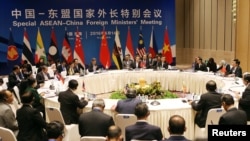Now you see it, now you don’t.
The foreign ministers of the Association of Southeast Asian Nations (ASEAN) conducted a clumsy variation of the magician’s sleight of hand act by issuing a tough joint statement on the South China Sea and then trying to make it quickly disappear.
“Incredible – and not in a good way” is how former U.S. Ambassador to the Asian Development Bank Curtis Chin described it.
The retraction “underscores both the high stakes involved in the South China Sea and how much further ASEAN has to go to come together to address some of the most important issues facing the region,” Chin told VOA on Wednesday.
“There’s something funny there. It’s highly unusual,” said Thitinan Pongsudhirak, director of the Institute of Security and International Studies at Chulalongkorn University, of the quick retraction. “I don’t recall it ever happening.”
The ASEAN ministers, meeting in Yuxi, in China's Yunnan province, on Monday and Tuesday, took a thinly veiled swipe at their hosts by expressing “serious concern” about rising tensions in the South China Sea.
The statement called for respect for international law amid a Chinese refusal to accept an upcoming Hague Tribunal ruling expected to favor Manila’s challenge of Beijing’s claims to most of the South China Sea.
Diplomatic sources Wednesday indicated that Chinese officials in private quickly pressured ASEAN to rescind the document after Malaysia’s foreign ministry released a copy to the media.
“This appears to be yet another instance of China using blunt diplomatic force to muzzle ASEAN on the South China Sea,” a senior diplomat stationed in an ASEAN capital told VOA.
Laos, which this year holds the rotating leadership of ASEAN, has “assured many stakeholders we wouldn’t see a repeat of 2012,” Thitinan told VOA.
Four years ago Cambodia, also seen as close to China, held the ASEAN chair and the main leaders’ summit ended with no communiqué – the first time that happened in its 45-year history.
However, the South China Sea dispute “in the last four years has intensified to the point it has to be mentioned in any joint statement,” said Thitinan. “The ground is really shifting. It’s becoming more frictional.”
The issuance and retraction reveals further disorganization and discord among the foreign ministers of ASEAN, long criticized as a toothless body for its failure to address and solve key regional issues.
“It would be a violation of diplomatic protocol to issue [a joint statement] unless it’s ready,” Thitinan explained. “There would be a deliberation and normally ASEAN members would have a read of the statement before it is issued.”
ASEAN is based on consensus and any statement by the regional body must be agreed upon by all ten member states.
The foreign ministry of China, which like the United States is a full dialogue partner of ASEAN, denied any official statement had been issued by the regional body at the foreign ministers’ meeting it hosted.
The controversy is merely a delusion of foreign reporters, according to the state-run Global Times, in a Wednesday Chinese-language editorial titled: "Asean slapped China in the face over South China Sea? Western media’s crazy thoughts."
The newspaper, however, on its English language website on Wednesday, also carried a staff-bylined article headlined: "ASEAN FMs retract sea dispute statement."
“Cooperation between China and ASEAN is far greater than any specific discord, including the South China Sea,” said Chinese Foreign Minister Wang Yi at a briefing for reporters.
A spokesperson for Malaysia’s foreign ministry tried to explain the surprise retraction by telling reporters “urgent amendments” were needed despite the ASEAN Secretariat having approved the statement’s release. However, no revised joint document was issued, while individual states were to release their own statements, according to ASEAN officials.
The foreign ministry of Singapore, which is the ASEAN-China coordinator, did issue a separate statement noting “the serious concerns expressed by ASEAN foreign ministers over the developments” concerning the disputed South China Sea.
Thailand’s foreign ministry, queried by correspondents in Bangkok for a statement, said it had “noted the requests” but hours later still had not issued any comment.
The debacle is “a very bad omen and it’s going to ratchet up the tensions,” between ASEAN and China, predicted professor Thitinan, the veteran ASEAN specialist at Chulalongkorn University in Bangkok.






